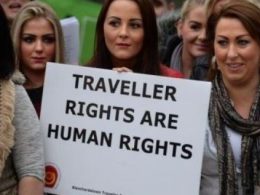By Jonathan Diebold
The cost-of-living crisis, or more accurately, the cost-of-surviving crisis, is here. Over three quarters of people in Ireland are concerned about the rising cost of essential items, and rightly so. People spent on average €31 more than they did last month on the same goods. These are the findings of the latest Deloitte State of the Consumer Tracker. The housing crisis, unaddressed for so many years by successive governments (in fact their pro-developer, pro-landlord policies have helped fuel it), together with the energy crisis, inflation, low pay, and myriad other factors means many are struggling to make ends meet.
Prices shooting up
Inflation, the increase in the cost of goods, was 5.5% for 2021. This is the first time since 2012 that it has risen above even 1%. Rents continue to rise — 10% in 2021 on average and up to 20% in some places. Wholesale electricity prices are up a whopping 260%, and the index for all wholesale energy products, including fuel, is up 160% and due to rise further with the upcoming increase in carbon tax. Many essential goods have risen above the rate of inflation, items like loaves of bread or boxes of tea bags have risen upwards of 10%, and in some cases as much as 20%, in the last 10 years.
This is made worse when you consider that these increases hit low income households and the low-paid the hardest. Working-class people pay a disproportionate amount of their income on essential bills and purchases and have fewer discretionary expenses that they can cut. Ireland has the 8th highest rate of low pay (pay that is two-thirds of the median wage) in the EU. This includes high numbers of frontline workers, such as retail workers and over half of hospitality workers, as well as 15% of healthcare workers. Ireland’s 380,000 low-paid workers are disproportionately young workers and women.
Economy built on working poor
The minimum wage acts as a floor for wages — when it rises, it has a knock-on effect on other wages, particularly for those on low wages. But for many, it feels like that floor is falling away. The minimum wage rose 2.9% this year, far below the rate of inflation (which itself is 2-3 times higher than official figures for the low-paid). This effectively is a wage cut, hitting not just the 10% of workers on the minimum wage (70% of whom are full-time workers), but having a knock-on effect on those who would normally see pay increases in proportion to the minimum wage.
The squeeze on our living standards stands in stark contrast to the situation facing the super-rich and big business. The richest nine billionaires increased their wealth by €18 billion during the pandemic and profits for big business are soaring. Prior to the opening of ESB to private competition energy prices in Ireland were kept at relatively low levels, but the logic of the private capitalist market has ensured they have risen dramatically in the last two decades.
Workers action needed
When Socialist Party TD Mick Barry put a motion before the Dáil calling for an emergency review of the national minimum wage to bring it at least in line with inflation, it was unanimously passed by the house. This shows the pressure that the government is under on the issue, but also its cynicism; this is a motion it clearly has no intention of enacting. While providing a useful platform for putting the government under pressure and raising the above points with the media and wider society, the passing of this motion also shows the need for action outside the Dáil and ultimately that change can only be achieved through mass action.
In Britain and the North, Unite the Union has won cost-of-living pay increases or better in 25 workplaces by taking industrial action or threatening to take industrial action. Trade unions must mobilise the power of their members and the wider working class to demand real action to address this crisis. Trade union members must organise from below to force such action.
The following are the type of measures needed to tackle the cost-of-living crisis:
- Double-digit pay increases to account for inflation and years of wage stagnation. For an index link between wages and any rise in the cost-of-living.
- For free public transport now — an essential environmental measure.
- For a minimum wage of €15/hour with no exemptions. Restore social welfare levels to €350 a week.
- Trade unions must act now and mobilise the power of their membership in both the public and private sector. We need a campaign to unionise workers throughout the economy.
- For rent cuts and freezes at affordable rates. For a major programme to build public homes on public land — end the reliance on developers and landlords. All homes that require it should be fully retrofitted and this should be done by a state-owned construction company — bring the major construction companies into democratic public ownership.
- Nationalise the major energy companies so that their price gouging and profiteering can be brought to an end. Slash energy bills for working people. For major investment in renewable energy to transform the national grid.
- Break with the capitalist market — take the key sections of the economy into democratic public ownership and plan the economy to provide for the needs of all people and the planet.










